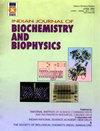Eleutherine bulbosa bulb extract induces apoptosis and inhibits cell migration by downregulating Sonic hedgehog in human tongue cancer cells: An in vitro study
IF 1.5
4区 生物学
Q4 BIOCHEMISTRY & MOLECULAR BIOLOGY
引用次数: 0
Abstract
Eleutherine bulbosa (Mill.) Urb. is a medicinal plant which has long been used to treat cancer. E. bulbosa bulb extract (EBBE) has been reported to show cytotoxicity towards several types of human cancer. However, the cytotoxic effect of EBBE towards tongue cancer cells has not been investigated. The present study aimed to evaluate the effects of EBBE towards the viability, apoptosis, and migratory activities of tongue cancer cells. Human oral squamous cell carcinoma (HSC)-3 cells were treated with various concentrations of EBBE for 24 h. The number of viable and apoptotic HSC-3 cells were measured using 3-(4,5-dimethylthiazol-2-yl)-2,5-diphenyltetrazolium bromide (MTT) and sub-G1 assay, respectively. The migratory activities of HSC-3 cells were assessed using scratch and transwell assay. Sonic hedgehog (SHH) expression was measured using immunoblotting. Upon EBBE treatment, apoptotic HSC-3 cells were significantly higher in a concentration-dependent manner (P <0.05). Meanwhile, viability, migratory activities, and migrated HSC-3 cell number were significantly lower in a concentration-dependent manner (P <0.05). The SHH expression levels in EBBE-treated HSC-3 cells were also lower in a concentration-dependent manner. EBBE reduces HSC-3 cell viability through apoptosis and inhibits its migratory activities by downregulating SHH expression.叶葱提取物通过下调Sonic hedgehog基因诱导人舌癌细胞凋亡和抑制细胞迁移的体外研究
凯瑟琳·布尔博萨(米尔)市区。是一种药用植物,长期以来被用来治疗癌症。据报道,黄球茎提取物(EBBE)对几种人类癌症具有细胞毒性。然而,EBBE对舌癌细胞的细胞毒性作用尚未被研究。本研究旨在探讨EBBE对舌癌细胞活力、凋亡和迁移活性的影响。用不同浓度的EBBE处理人口腔鳞癌(HSC)-3细胞24小时,分别用3-(4,5-二甲基噻唑-2-基)-2,5-二苯基溴化四唑(MTT)和亚g1法测定存活和凋亡的HSC-3细胞的数量。采用划痕法和transwell法评估HSC-3细胞的迁移能力。采用免疫印迹法检测SHH的表达。经EBBE处理后,凋亡的HSC-3细胞呈浓度依赖性显著升高(P <0.05)。同时,细胞活力、迁移活性和迁移的HSC-3细胞数量显著降低,且呈浓度依赖性(P <0.05)。在ebbe处理的HSC-3细胞中,SHH表达水平也呈浓度依赖性降低。EBBE通过凋亡降低HSC-3细胞活力,并通过下调SHH表达抑制其迁移活性。
本文章由计算机程序翻译,如有差异,请以英文原文为准。
求助全文
约1分钟内获得全文
求助全文
来源期刊

Indian journal of biochemistry & biophysics
生物-生化与分子生物学
CiteScore
2.90
自引率
50.00%
发文量
88
审稿时长
3 months
期刊介绍:
Started in 1964, this journal publishes original research articles in the following areas: structure-function relationships of biomolecules; biomolecular recognition, protein-protein and protein-DNA interactions; gene-cloning, genetic engineering, genome analysis, gene targeting, gene expression, vectors, gene therapy; drug targeting, drug design; molecular basis of genetic diseases; conformational studies, computer simulation, novel DNA structures and their biological implications, protein folding; enzymes structure, catalytic mechanisms, regulation; membrane biochemistry, transport, ion channels, signal transduction, cell-cell communication, glycobiology; receptors, antigen-antibody binding, neurochemistry, ageing, apoptosis, cell cycle control; hormones, growth factors; oncogenes, host-virus interactions, viral assembly and structure; intermediary metabolism, molecular basis of disease processes, vitamins, coenzymes, carrier proteins, toxicology; plant and microbial biochemistry; surface forces, micelles and microemulsions, colloids, electrical phenomena, etc. in biological systems. Solicited peer reviewed articles on contemporary Themes and Methods in Biochemistry and Biophysics form an important feature of IJBB.
Review articles on a current topic in the above fields are also considered. They must dwell more on research work done during the last couple of years in the field and authors should integrate their own work with that of others with acumen and authenticity, mere compilation of references by a third party is discouraged. While IJBB strongly promotes innovative novel research works for publication as full length papers, it also considers research data emanating from limited objectives, and extension of ongoing experimental works as ‘Notes’. IJBB follows “Double Blind Review process” where author names, affiliations and other correspondence details are removed to ensure fare evaluation. At the same time, reviewer names are not disclosed to authors.
 求助内容:
求助内容: 应助结果提醒方式:
应助结果提醒方式:


